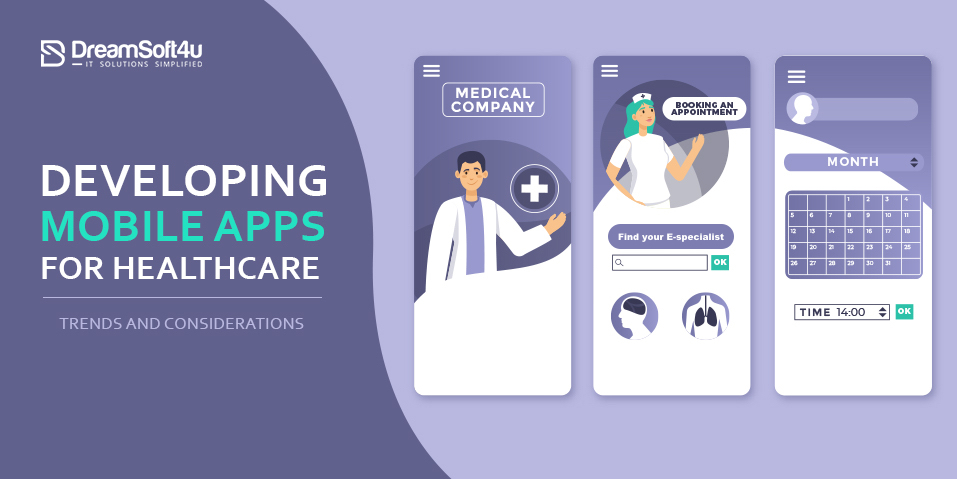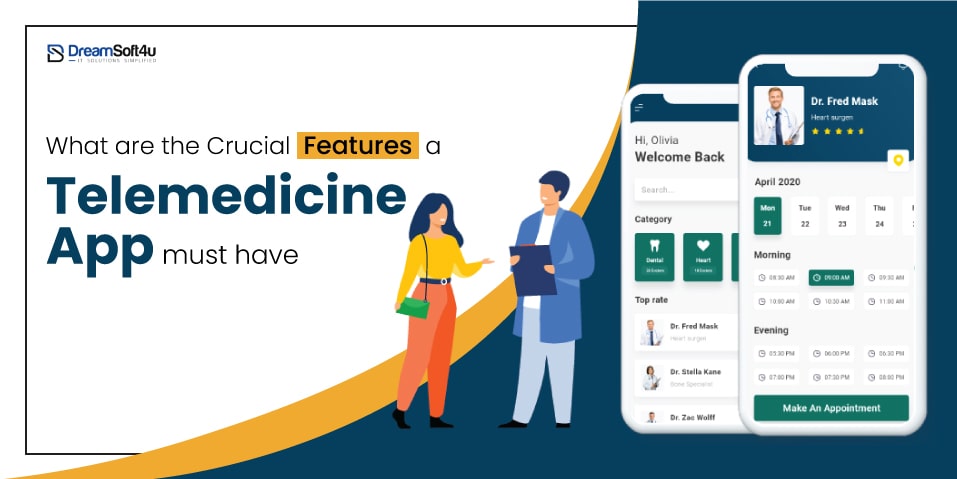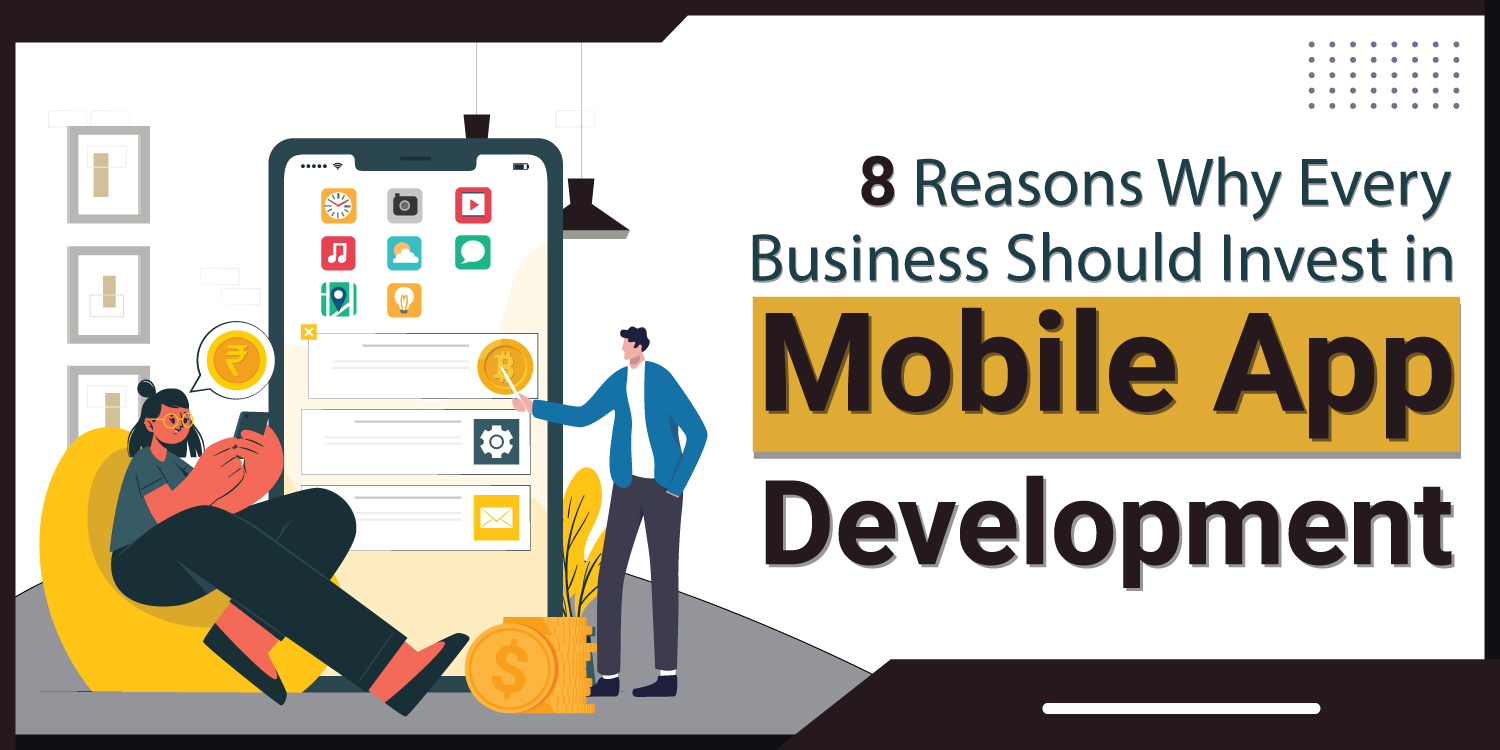The widespread use of mobile technologies is driving a dramatic change in the healthcare sector. Nowadays, almost every industry relies on mobile applications and websites for its global presence. Similarly, the health industry is also enhancing its services with applications by providing a patient platform to communicate with doctors. Using these platforms, patients can easily schedule an appointment for a check-up and get proper treatment at their home with convenience. Therefore everyone needs a mobile apps for healthcare to access medical care.
The way we receive and provide healthcare is being profoundly altered by current developments and the latest technology in mobile app development. These developments enable patients, simplify the delivery of care, and eventually open the door to a healthier future by utilizing telehealth consultations. Patients can also personalize their health management systems and other advanced features of the healthcare app. Therefore, let’s explore the innovative patterns influencing the field of healthcare mobile apps and offer a thorough examination of how these developments are changing the way we think about healthcare.
Table of Contents
ToggleModern Healthcare Trends
1. AI & ML: AI and ML have become the core of model technology as they are ever-evolving systems that adapt to the newest trends and deliver top output. In healthcare apps, AI and ML are very important as they reduce the doctors’ diagnosis process and assist patients in case of doctors’ absence.
2. Telehealth Services: Telehealth platforms are dedicated portals for patients and doctors to talk about their medical conditions. In the Telehealth app, patients can schedule an appointment with a doctor from their home and communicate about the illness through video calls.
3. BlockChain technology: Blockchain technology is being adopted to enhance the security and transparency of healthcare data. It ensures secure data exchange within the healthcare platform. Additionally, it improves the accuracy of patient records and provides an exact proof system for maintaining patient confidentiality and integrity of medical information.
4. EHR system integration: Modern healthcare technology needs modern solutions like EHR system integration. It can be a hectic and complex process to maintain records and save data on patient interactions with doctors on telehealth platforms. So, the EHR system shows the exact data and patient history along with medical reports on the telehealth platform.
5. Enhanced UI/UX Design: UI/UX design is the structural value of any app. Although Healthcare apps prioritize security and patient care, they will only be useful if the app interface is good and non-interactive. So many modern tools are introduced to enhance the UI/UX design of the app, which helps to engage the customers along with a great retention rate.
Although many other latest trends can improve healthcare apps and technology. Currently, many companies are utilizing low-code, No-code technology to pace up the development and create custom Software.
Key Considerations When Building a Healthcare App
User Experience
During app development for healthcare, focus on an intuitive user experience. Patients and providers want an app that is easy to navigate and understand. Consider:
- A simple, clean interface without clutter.
- Use icons and images to help guide the user.
- Group related features together in a way that makes sense.
- Avoids medical jargon. Write content for a general audience.
- Built-in help or support. Include FAQs, tutorials, or live chat.
Data Security
Healthcare mobile app development needs to handle sensitive personal information, so data security is essential. Some recommendations:
- Encrypt all data, especially personal details, and health records.
- Implement strong passwords and two-factor authentication.
- Limit access to data and implement role-based permissions for users.
- Conduct regular security audits and penetration testing.
- Address any vulnerabilities to prevent data breaches.
- Comply with all healthcare data privacy laws like HIPAA.
Integration with Existing Systems
Integration with electronic health records (EHRs) and other systems is key for the most mobile healthcare solutions. Some options to explore include:
- APIs that connect to various EHR platforms and health-tracking devices.
- HL7 and FHIR standards for exchanging healthcare information between systems.
- Partnerships with healthcare organizations and insurance providers.
Building a healthcare app is challenging, but focusing on the user, security, and integration will help create mobile healthcare solutions that truly transform the industry.
Core Features and Functionalities of Healthcare Mobile Apps
Core Features
The core features of any healthcare app should focus on improving patient outcomes and experience. Some essential features include:
- Appointment scheduling and reminders.
- Health records and history.
- An AI-powered symptom checker
- Secure messaging so patients can communicate directly with their doctor or care team
- Trusted health resources, articles, and videos.
- Wearable integration ( For apps focused on chronic disease management or wellness)
- Emergency alerts to contact emergency services
- GPS location sharing
- Surveys and feedback.
User Experience and Design Considerations
When designing a healthcare app, user experience and interface are key. Keep these tips in mind:
Simplicity is key
Healthcare apps should be incredibly easy to use. Keep the interface minimal and uncluttered. Use large buttons, and simple navigation, and avoid overly technical medical jargon when possible.
Accessibility for all
Follow accessibility guidelines to ensure your app can be used by anyone. This includes text-to-speech, font size changes, colorblind-friendly color palettes, and more.
Privacy and security
Healthcare data is highly sensitive. Patients will only use an app they can trust. Encrypt data using secure authentication methods like biometrics or two-factor authentication, and be transparent about how data is collected and used.
Personalization
The more personalized the experience, the more valuable the app will be. Allow users to customize the app to their needs and conditions. Let them choose what information and tools are most relevant to them.
Clear value
Demonstrate the key benefits and value of your app upfront. Whether it’s saving time, reducing costs, or improving outcomes, show how your app can positively impact patients and providers.
Development Approaches and Technologies for Healthcare Mobile Apps
When developing healthcare mobile apps, specific approaches and technologies should be considered.
Native Apps
Native apps are built specifically for a mobile platform like iOS or Android. They provide the best user experience but require developing/maintaining separate apps for each platform. Native development uses Swift or Objective-C for iOS and Java or Kotlin for Android.
Cross-Platform Apps
Cross-platform app development uses a single codebase to create apps for multiple platforms. Frameworks like React Native and Flutter allow you to reuse code across iOS and Android. While cross-platform apps may lack some native functionality, they can reduce time and costs.
Progressive Web Apps
Progressive web apps or PWAs are mobile-friendly websites that work like native apps. They offer benefits like working offline, push notifications, and an app-like experience. PWAs only require building and maintaining a single web app, reducing development efforts. However, they may lack some native device features.
Application Programming Interfaces
Application programming interfaces or APIs in mobile app development allow data and services access from other systems. Healthcare organizations can build APIs to share data between internal systems and mobile apps. Public APIs from sources like smart devices and wearables provide access to patient health data for third-party mobile health apps.
Testing and QA for Healthcare Mobile Apps
To ensure your healthcare app provides an exceptional user experience and functions properly, extensive testing is required. As an app developer, you’ll want to test for:
- Functionality: Does your app work as intended on all supported devices and operating systems? Are there any bugs that could impact usability or accessibility? Thoroughly test all features and user flows.
- Security: Healthcare apps handle sensitive patient data, so security testing is essential. Check for any vulnerabilities that could compromise user privacy or allow unauthorized access. Penetration testing and code audits should be performed.
- Performance: Healthcare professionals and patients will expect fast load times and response rates. Be sure to test your app under peak usage conditions to identify any performance bottlenecks.
- Compliance: Mobile healthcare apps must meet compliance standards like HIPAA. Work with healthcare compliance experts to evaluate if your app satisfies all necessary regulations.
- User experience: Have nurses, doctors, and patients test your app to get feedback on the overall user experience. Look for any pain points in the UI or workflows that could frustrate your target users.
Rigorous testing will result in a high-quality healthcare app development that transforms the patient experience through a seamless, secure, and compliant mobile experience. Don’t cut corners in testing—your users and their data depend on it.
Regulatory and Compliance Considerations
When developing healthcare apps, you must ensure compliance with HIPAA, HITECH, and FDA regulations. HIPAA and HITECH establish requirements around privacy, security, and breach notification to protect patient’s protected health information (PHI). The FDA regulates medical devices, including mobile medical apps, to ensure safety and effectiveness.
To comply with HIPAA and HITECH, build in security measures like two-factor authentication, data encryption, and role-based access controls. Have patients provide informed consent for how their PHI will be collected and used. And be prepared to issue breach notifications if PHI is compromised.
For FDA compliance, determine if your mobile healthcare solutions qualify as medical devices. If so, follow design controls and quality systems regulations in development. The FDA may require premarket review for higher-risk apps. Stay up-to-date with evolving guidance on health software.
Regulations help ensure privacy, security, and patient safety. But navigating them can be complicated for healthcare startups and app developers. Partnering with experts in healthcare compliance and regulation is often the smartest strategy. They can review your app, point out any issues, and recommend solutions to bring it into compliance before going to market. Because in healthcare, compliance does matter.
Stay with the Market Trends with Dreamsoft4u Healthcare App Development
Let’s get you started!
Wearable and Implantable Devices are Emerging Technologies in Healthcare Mobile Apps
Wearable and implantable medical devices are an emerging trend in healthcare mobile apps. These devices can monitor health metrics 24/7 and provide real-time data to your doctors. Many people are already familiar with fitness trackers and smartwatches.
Implantable devices take this a step further by placing sensors inside the body. Pacemakers and insulin pumps are early examples, but newer technologies are actively being developed. While exciting, these technologies also raise privacy concerns.
Strict regulations on how personal health data can be collected, stored, and shared will be needed to gain user trust. If done responsibly, wearable and implantable devices paired with mobile health apps could transform how conditions are monitored and treated.
Conclusion
Overall, Healthcare mobile applications are charging up with the latest trends and ideas that not only enhance patients’ experience but also improve Doctors’ trust and reliability on the platform. Many top companies are following these latest healthcare trends to simplify the complex process of doctors and guide patients with urgent care. So we mentioned all the necessary information about the latest trends that are following up healthcare. Additionally, check out the considerations that you need to implement in your healthcare app to engage more customers and retain their trust in the platform.
FAQs
Q1 What are the key modern trends in developing mobile apps for healthcare?
Key modern trends include the integration of artificial intelligence (AI) and machine learning (ML) for predictive analytics and personalized treatment plans. Additional professionals also use the Internet of Things (IoT) for real-time health monitoring. It helps the app to emphasize user-centric design to improve user experience.
Q2 What is the need to follow up with the latest trends?
Latest trends improve the experience of customers. Additionally, any mobile application or business form must stay ahead of the competitor marketplace. So, it is necessary to integrate the latest technology in the healthcare mobile application to stay updated and give a better approach to patient care. Overall, the latest trends enhance your brand value and customer experience.
Q3 Can I integrate the latest trends with a low-budget app?
One of the major misconceptions is that the nutrients will be very costly and can shake the budget of your project. However, it’s not the same with healthcare development companies. Investors have to make the right choice to find the best company to develop healthcare mobile applications for the formal representation of their business idea. Additionally, skilled developers can easily integrate the latest trends at your desired budget.
Q4 How does a healthcare app benefit patients with the latest technology?
Healthcare apps with the latest technology enhance the patient experience by providing them with various features and early diagnosis of illness. Overall, when a patient finds every service they need under a single platform, they won’t consider any other platform for healthcare IT consulting services. Additionally, patients will also recommend their relatives and know about the technology and service of your application.
Q5 What is the role of AI in patient care?
AI eases the lives of patients in emergencies. It may be hard to find out 24 x 7 on the app. In this scenario, AI alerts the professionals nearby to assist you ASAP. Moreover, if the doctor’s appointment is full, then you also get the help of AI for your general diagnosis.


















